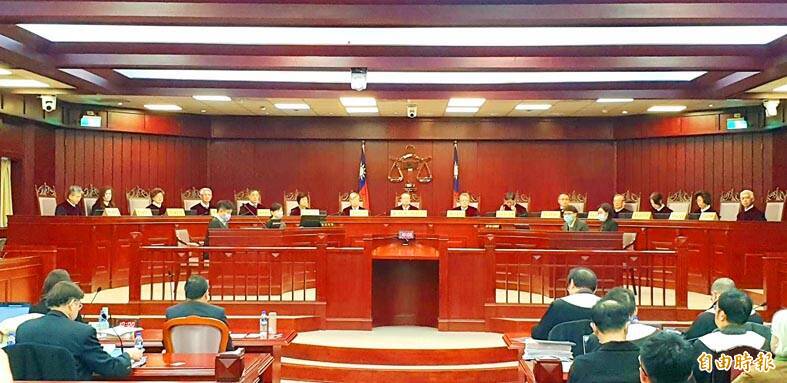《TAIPEI TIMES》Slander as a crime constitutional: court

The bench of the Constitutional Court is pictured yesterday. Photo: Yang Kuo-wen, Taipei Times
By Yang Kuo-wen and Jake Chung / Staff reporters, with staff writer
The Constitutional Court yesterday ruled that slander as a punishable crime is constitutional, but its scope should be better defined.
The court heard 31 petitions for constitutional interpretation, including 20 filed by judges who said that slander was not clearly defined in practice and was not in line with the principle of unambiguous law.
Writer Chang Ta-chun (張大春) and media personality Neil Peng (馮光遠) also filed for a constitutional interpretation of slander after they were found guilty by local courts, saying that the rulings infringed on their right to free speech.
Chang was ordered to pay NT$3,000 for defaming the late pundit Liu Chun-yao (劉駿耀) in 2014 after calling him “shameful,” while Peng was ordered to pay NT$5,000 to former National Security Council secretary-general King Pu-tsung (金溥聰) in 2015.
Item 1, Article 309 of the Criminal Code states that a person who publicly insults another shall be sentenced to short-term imprisonment or a fine of not more than NT$9,0000. In practice, swear words and comments denigrating others as animals are common.
Meanwhile, Item 2, Article 309 states that a person who by violence commits an offense specified in the preceding paragraph shall be sentenced to imprisonment of not more than one year or a fine of not more than NT$15,000.
The Constitutional Court yesterday said that the law should not consider name-calling during arguments sufficient grounds to sustain defamation and that the environment, context, tone and reason for the argument should be taken into consideration.
The court said that whether one’s speech should be considered slander should be judged on how much it would affect the reputation of the person slandered, and whether said comments were conducive toward public affairs, literary matters or an expression of art, or positively contribute to academia or other professional domains, and whether, in isolated cases, one’s reputation should take precedence over one’s freedom of speech.
Only under such parameters would public slander not go against constitutionally guaranteed freedom of speech, it added.
Following the Constitutional Court’s interpretation yesterday, lawyers said that it would significantly change the landscape of the judiciary and greatly reduce the number of defamation lawsuits.
During a debate at the Constitutional Court last year, Ministry of Justice representative Kuo Yung-fa (郭永發) said that Article 309 of the Criminal Code was established to uphold people’s reputations, which is considered a basic right guaranteed by the Constitution.
Peng said that his comments, while poignant and acerbic, should be taken as political commentary, adding that Article 309 does not offer protection for commentary that could fit the criteria for slander.
新聞來源:TAIPEI TIMES


















